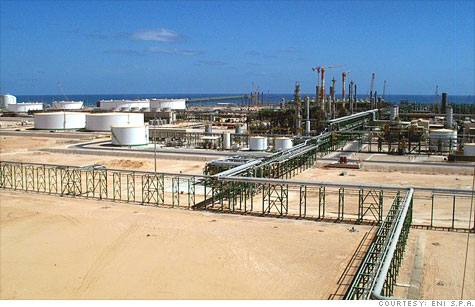
iBet uBet web content aggregator. Adding the entire web to your favor.
Link to original content: https://money.cnn.com/2011/10/25/news/international/libya_oil/index.htm


Libya could double the amount of oil it was producing before the war, but firms are waiting for an updated legal framework.
NEW YORK (CNNMoney) -- Western oil companies are eager to jump back into Libya, but without strong oil laws there they are hesitant to invest the billions of dollars needed to boost production.
Before the fighting broke out, the country produced about 1.6 million barrels of oil per day. Of that, the Libyan National Oil Company controlled about 1.1 million.
A handful of Western oil companies, including Italy's Eni (E), France's Total (TOT) and ConocoPhillips (COP, Fortune 500), Marathon (MRO, Fortune 500), Hess (HES, Fortune 500) and Occidental (OXY, Fortune 500) account for most of the remaining oil, with Eni being the largest player.
But under Moammar Gadhafi the terms of those deals were strict. The dictator effectively imposed a 93% tax on any oil the companies produced in Libya.
"This 93% is a joke," said Fadel Gheit, a senior energy analyst at Oppenheimer. "Not even Russia has that."
A more palatable rate would be something like Norway's 75%, said Gheit. A U.S.-style 50% would be a downright gift.
As Libya's oil production begins to come back online, the new government has kept the terms and conditions from the Gadhafi era law, for the time being.
No one is expecting a reduction to a 50% rate, but some changes are expected.
A debate is taking place within the National Oil Company over how much access should be given to the international oil firms, said Ross Cassidy, a Libyan oil analyst at the energy research firm Wood Mackenzie.
Cassidy doesn't expect a change in the royalty rate, but he said companies may be granted more more access to existing oil fields or more acreage to explore.
Generally, the lower the tax rate or the more access international oil firms have -- the more they will be enticed to invest.
There's certainly incentive for Libya to want to attract foreign investment.
The 1.6 million barrels-per-day production was apparently enough to satisfy Gadhafi, said Gheit, who let very little of that wealth trickle down to his people. He also did not reinvest much of that money back into his oil fields.
As a result, the equipment is aging and the fields are not producing as much as they could be.
But the potential is there. It's thought that with the right investment in the old fields, plus an aggressive exploration program to comb the 90% of the country that has yet to be explored, Libya could double its pre-war oil production level to 3 million barrels a day.
At current prices, that would bring in $300 million of much-needed revenue a day.
The companies are there. The firms currently operating in the country have pledged to help Libya modernize their existing fields. And heavyweights BP (BP) and Royal Dutch Shell (RDSA) have committed to billion-dollar exploration programs in the years ahead, said Wood Mackenzie's Cassidy.
Exxon Mobil (XOM, Fortune 500) also took at stab at finding new oil reserves in the Libyan desert a few years back, but abandoned its effort after drilling a few dry wells. But that doesn't mean the company won't come back if the right conditions materialize.
In statements to CNNMoney, many of the firms already operating in Libya say they are eager to resume production, as soon as conditions on the ground make the country safe for employees.
But analysts say it's not even the violence that's keeping the big investments on the sidelines.
"The oil companies have been operating in violent regions for decades," said Anas Alhajji, chief economist NGP Energy Capital Management. "What matters at this stage is the legal framework and the sanctity of the contracts."
It's hoped the new government is easier for the companies to deal with than the Gadhafi regime, but for now many are taking a wait-and-see approach.
Many of the new government's leaders are former members of the old regime. And judging by the way in which Gadhafi met his demise, the new leadership isn't exactly confidence-inspiring.
| Overnight Avg Rate | Latest | Change | Last Week |
|---|---|---|---|
| 30 yr fixed | 3.80% | 3.88% | |
| 15 yr fixed | 3.20% | 3.23% | |
| 5/1 ARM | 3.84% | 3.88% | |
| 30 yr refi | 3.82% | 3.93% | |
| 15 yr refi | 3.20% | 3.23% |
Today's featured rates: